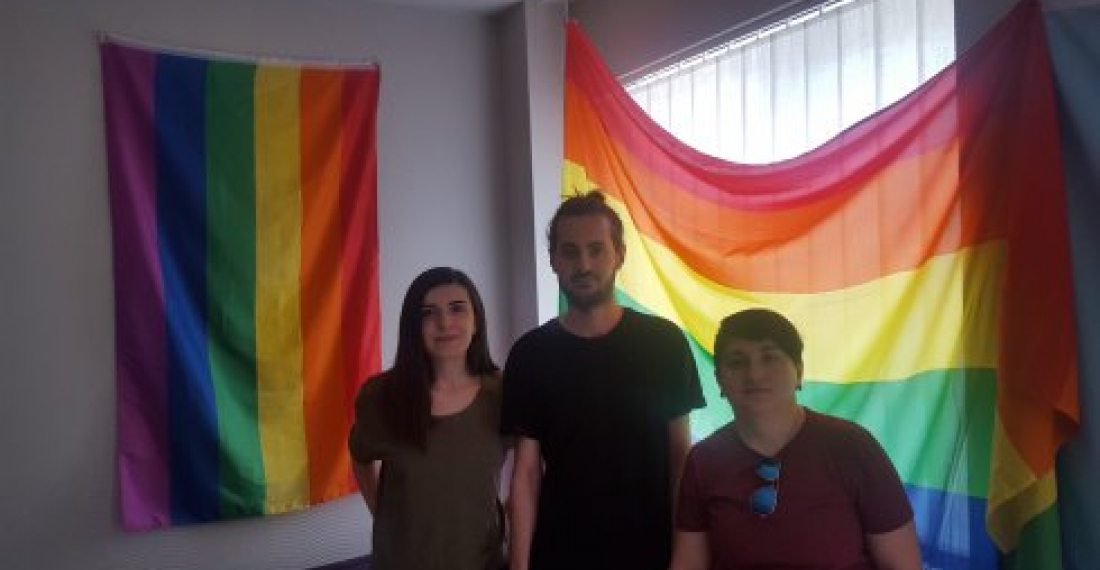Recent legislation has given rights and protection to Georgia's LGBT community, but society is still catching up, as Joseph d'Urso outlines in this special report for commonspace.eu
In many ways, being LGBT in Georgia is a big improvement on how it used to be. Progressive laws are in place and support groups are more visible than ever. The overall situation is much better than in neighbouring countries.
But according to activists, society is not yet as progressive as the laws, and in the run up to elections in October, some politicians are whipping up homophobia to win votes.
Some politicians regularly make homophobic statements, and even the supposedly liberal parties do little to push back, says Natia Gvianishvili, director of Women's Initiatives Supporting Group, a rights group.
"We are treated as a ball being tossed around on the field, and everybody's trying to score their own goals, but these don't really affect us positively, they only affect us negatively."
She acknowledges there have been big improvements for LGBT people in the legal sphere, such as an anti-discrimination bill passed in 2014 despite opposition from the Church.
Progressive reforms like this are part of a comprehensive package of reforms that Georgia has been implementing as part of its policy of closer integration with the European Union. The government has been under attack from conservative religious groups and pro-Moscow parties for its non-discriminatory policies. Even so some activists are not convinced.
"These [progressive legal] changes occur because of a checklist we have, not because the government has an understanding of the sensitivity towards minority grounds," says Gvianishvili.
"Often, politicians try to mobilise voters based on homophobia," says Levan Berianidze of LGBT Georgia. The gay community see marriage as an unnecessary distraction rather than a feasible goal given the level of opposition in the country, he says in reference to an artificial debate that was introduced when a petition with over 200,000 signatures, calling for a referendum to amend Georgia's constitution to define marriage as being between a man and a woman was submitted. The measure was eventually vetoed by President Margvelashvili on the ground that such an interpretation already existed in Georgia's civil code.
 Beka Gabadadze is a social worker for Tanadgoma, a charity providing health services to LGBT people in Tbilisi. He works with sex workers and other vulnerable people in the capital.
Beka Gabadadze is a social worker for Tanadgoma, a charity providing health services to LGBT people in Tbilisi. He works with sex workers and other vulnerable people in the capital.
LGBT datings apps which are popular in western countries have not made great inroads in Georgia, he says, because people are worried about being found by neighbours or relatives. Many use apps such as Grindr, but show other body parts such as their torso instead of their face, he says, although norms are shifting.
"Two years ago when I downloaded Grindr there were three faces, one was me, one was my colleague ... now there are 11, so something is changing!"
Gabadadze is keen not to be too negative about his country, and strongly encourages LGBT tourists to come to Georgia.
"It's not that somebody will kill you if they hear that you are gay, we don't have that kind of situation... if we compare with Armenia and Azerbaijan, attitudes are not as homophobic."
As well as its work on sexual health, his organisation also runs workshops helping parents come to terms with the fact their child is LGBT. His own mother attended one.
"Two weeks ago my father's friend died and I went to the cemetery, and people were chatting about me," he said. "My mother is living in [second city] Kutaisi, and people are bullying her. People think that if woman has a gay son, it's her mistake."
May 17, International Day Against Homophobia and Transphobia (IDAHO Day) is a special day for Georgia's LGBT community. It is always marked by small protests and larger counter-protests. In 2013, activists were beaten up. Since then, rallies have been lower key.
Hate crimes are a big problem, says Lika Jalagania a human rights lawyer. Two years ago, Sabi Beriani, a transgender woman, was stabbed to death and burned in her apartment. The culprit was charged with property damage, not a transphobic hate crime.
People who deviate from traditional styles, such as a man wearing earrings or a woman with short hair, can also fall victim to violence whether they are gay or not, says Jalagania.
Violence is often just as bad in the family as it is in the street, she says. "If you're trying to come out in Batumi, it's like suicide."
In rankings compiled by Rainbow Europe, an NGO, Georgia comes 31st out of 49 European countries for its LGBT laws and policies, above Italy and Romania.
The bottom four countries in the list are Georgia's four neighbours, Turkey, Armenia, Russia and Azerbaijan. "Compared to them we're not that bad," says Natia Gvianishvili, although she reiterates that laws and social values are two very different things.
She is optimistic about her country's future direction, as long as its leaders keep aiming west. "As long as our direction is towards the EU, we'll keep improving."
source: This special report was prepared by jospeh d'Urso for commonspace.eu
photo 1: Lika Jalagania, Levan Berianidze, and Natia Gvianishvili
photo 2 Beka Gabadadze, a social worker for Tanadogma, an LGBT charity






